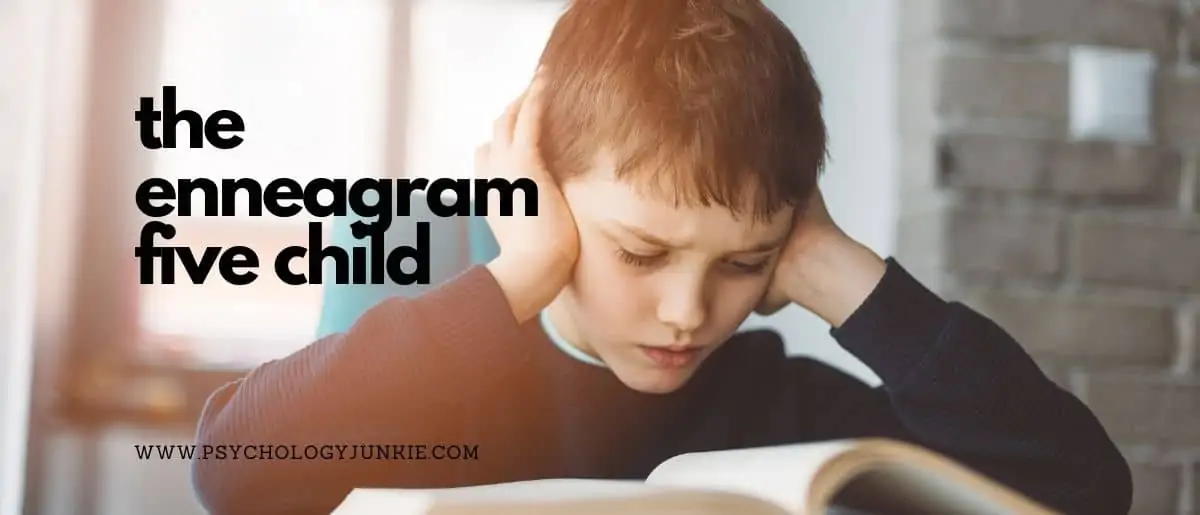What’s My Child’s Enneagram Type? Tips for Finding Out!
Can the Enneagram Be Used for Kids? Absolutely!
When it comes to understanding your children, one of the best tools for doing this is the Enneagram. This in-depth system of typology helps you to determine your childhood wounds, core fears, core desires, and coping mechanisms. Today I’m going to help you identify your child’s type by looking at some of the characteristics of each enneagram type.
Disclaimer: It can take time to decipher your child’s enneatype! If you feel like you have a type narrowed down, then definitely use whatever tips you choose! But make sure not to use their enneatype to limit them or “stereotype” them. Also, there are no “good” or “bad” enneatypes. Each type has its own unique strengths and weaknesses.

Not sure what your enneagram type is? Take our new personality questionnaire here!
The Enneagram One Child
This child is going to be hyper-focused on responsibility and doing things right. Likely a perfectionist, the One is inwardly critical and, in childhood, often outwardly critical as well. Some are more focused on keeping everyone else in line, while others focus primarily on themselves and their own standards. The core desire of this enneatype is to be good and to have integrity. If they are brought up in strictly religious families they may have anxiety about living up to the religious standards of their parents.
Qualities of the Enneatype One Child:
- Highly self-critical
- Perfectionistic
- Responsible
- Prone towards repressing their anger
- Self-righteous at times
- Anxious when their projects aren’t perfect
- Focused on living up to the expectations of their parents or teachers
- Hesitant to ask for help
- Punctual
- Struggle with feelings of not being “good enough”
- Frustrated that others don’t try as hard as they do
- Serious and pragmatic
- Have a strong sense of justice
Tips for Parenting an Enneatype One:
- Show up on time.
- Follow through on your word.
- They may act like mini-adults, but don’t start giving them the responsibilities of adults.
- Help them to manage stress through calming activities and/or meditation.
- Help them to express their anger and recognize that it doesn’t make them bad to be angry.
- Encourage them to have silly, playful, creative moments every day.
- Help them to develop realistic expectations for themselves and others.
The Enneagram Two Child
Generous and helpful, Children with the Two enneatype are deeply concerned about serving other people and meeting their needs. Deep down, they are often afraid that they are unlovable and so they must be selfless in order to earn love and affirmation. Often gregarious and expressive, Twos enjoy helping people solve problems and listening to their emotional concerns. They are often complementary and empathetic, and innately know what other people (especially their parents) need without having to be told. They will usually keep up with their responsibilities and need a great deal of affection and words of affirmation.
Qualities of the Enneatype Two Child:
- They often put other people first
- They can be people-pleasers
- Feel very upset and rejected when there are interpersonal issues
- Need close relationships
- Wait to see what everyone else wants before stating what they want
- Read people well
- Sensitive to praise and criticism
- Want to be popular
- Struggle to say no
- Burn-out from overdoing it for others
- Have a good sense of humor
- Easily empathize
Tips for Parenting an Enneatype Two Child:
- Teach them the importance of saying “No,” and setting boundaries.
- Show them that their worth isn’t reliant on what they do for you.
- Nurture them and give lots of physical affection.
- Remind them to take care of themselves as well as they take care of others.
- Encourage them to state what they want instead of waiting for direction from other people.
- Validate their feelings and generosity.
- Role-play situations where they can practice speaking up for themselves.
- Teach them that they aren’t responsible for everyone else’s feelings.
- Make sure they get time alone to pursue their own independent interests.
The Enneagram Three Child
Driven by success and achievement, Enneatype Threes are born to WIN! These types are highly competitive and want to be the best at everything they pursue. It can be easy for them to feel like their worth lies in their achievements, so it’s vital for parents to teach them that they are loved for who they are and not just what they accomplish. Three children want to be active and busy and are extremely persistent in pursuit of their goals. They usually pay close attention to what’s popular and how to dress to make a good impression. They want to impress people, so they may have issues with bragging or putting on a “persona” to make the most winning impact. Fitting into the social scene tends to come easily for Threes, because they instinctively pick up on the things that impress other people. Quick, clever, and efficient – these types chase after their ambitions to escape their core fear of being worthless without success.
Qualities of the Enneatype Three Child:
- Persistent and ambitious
- Visionary and outwardly confident
- Focus on their appearance a great deal
- Often the “teacher’s pet”
- Busy and active
- Love it when they can impress someone
- Inspiring
- See opportunities everywhere
- Crave popularity and accomplishment
- Competitive
- Care a great deal about grades, awards, and symbols of success
- Tend to have good manners or “charm”
Tips for Parenting an Enneatype Three Child:
- Impress on them that they are loved for who they are, not just what they do.
- Help them to consider what they value that doesn’t have a “prize” or symbol of recognition
- Help them to be patient with children who aren’t as quick-moving as they are
- These children can be overly influenced by others. Help them to assess their personal values by asking questions like, “What do you love?” “What would you live and die for?” “What causes are important to you?”
- Help them not to take on so many obligations that they get burned out
- Show interest in their inner world, thoughts, and feelings.
- Give them opportunities to be creative, playful, and silly.
- Encourage them to let others be the center of attention.
- Actively listen to them and teach them to actively listen to others.
The Enneagram Four Child
Creative and introspective, the Four child is sensitive and prone towards melancholy. These children dream of being understood and finding their own unique identity in the world. Frequently they feel misunderstood and out of place in their families. Often they are the “oddball” or unusual one in the family. It’s important for parents to realize this and reach out to them. They thrive when they can be encouraged in their unique abilities and recognized for who they are, rather than feeling bad for being different. Fours enjoy the arts and are deeply moved by fantasy play, stories, or movies. They tend to want what they don’t have and can struggle with envy – especially of other children who seem to fit in so easily.
Signs of the Enneatype Four Child:
- Often shy and melancholy
- Can be overwhelmed by their own emotions
- Find special meaning where others don’t
- Drawn towards creative pursuits
- Deeply intuitive
- Can appear moody and self-absorbed
- Crave understanding
- Sensitive to criticism
- Idealistic and imaginative
- Prone to daydreaming
- Authentic and emotionally honest
- Want to be seen as one-of-a-kind
- Search for meaning and beauty
Tips for Parenting an Enneatype Four Child:
- Often introverted, Fours struggle when they have to be around people for long periods. School can be overwhelming to them. Try to support and comfort them during these times.
- Give them regular alone time to decompress and process their feelings.
- Validate their feelings, even if you don’t understand them.
- Give them specific compliments rather than generalized compliments.
- Discipline with kindness and a calm temper.
- If Fours’ feelings are hurt they will struggle to focus on other things like homework. Give them a journal to write out their feelings, and allow extra time to process emotions before studying.
- Encourage their imagination. Read them bedtime stories, watch movies with them, and give them creative tools to play with.
Read This Next: 7 Struggles of the Enneagram Four Type
The Enneagram Five Child
Curious and introverted, the Five child has a restless hunger for information and mastery. On the outside, they can appear mysterious, isolative, knowledge-hungry, and cynical. On the inside, they are often worried that they aren’t as capable as the other people they know. They worry that they won’t be ready for life in the outside world. As a way to deal with this insecurity, they gather data and information and try to understand how the world works. Usually avid readers, they tend to prefer being alone in their rooms where they can get lost in their interests and hobbies. They are often reluctant to be aggressive, loud, or expressive. By presenting a calm, stoic demeanor they feel that they can defend themselves from being overwhelmed or weakened.
Signs of the Enneatype Five Child:
- Observe more than talk
- Hate being barged in on
- Get lost in their interests for hours
- Try to hide their sensitivity to criticism and punishment
- Guarded of their own feelings
- Annoyed by brash, loud people
- Reluctant to express emotions
- Feel invisible
- Want to appear unaffected
- Curious about how things work
- Whimsical or offbeat sense of humor
- Uninterested in social norms
- Hate it when people pry
- May hoard things that they enjoy (food, alone time, space, books, movies)
Tips for Parenting an Enneagram Five Child:
- Don’t push them to socialize too much.
- Don’t encourage then to “be like everyone else,” they won’t (and that’s just fine).
- Try to shield them from a lot of loud, unpleasant sounds or interruptions
- Give them plenty of alone time each day
- Give them logical reasons for rules and traditions. Don’t expect them to follow blindly.
- Try not to put them on the spot socially.
- Encourage them to take some time each day to play, get outside, and be active.
- Make sure they are eating and drinking enough. Fives can be so heady that they lose touch with their physical needs.
- When they talk to you, listen. It’s more energy-intensive for Fives to talk than it is for many other types, and they hate repeating themselves.
- Be straightforward.
- Realize that they might find overt displays of emotion and affection overwhelming.
Read This Next: 7 Struggles of the Enneagram Five
The Enneagram Six Child
Six children often have a buzz of anxiety rippling around their consciousness. They easily see worst-case scenarios and possibilities all around them and can be either very security-seeking (phobic Sixes) or confrontational of their fear (Counterphobic Sixes). They can also be a blend of both! Six children like security, loyalty, and knowledge of what is going to happen and when. They can be hesitant around authority figures; wanting to trust them, but simultaneously playing devil’s advocate. They can be very strategic and insightful, but they can also be hyper-vigilant and doubtful. Usually hardworking, they do whatever they can to create safeguards for their lives. They spend a lot of time planning, organizing, and envisioning. In relationships, they are usually very loyal, supportive, and compassionate.
Signs of the Enneatype Six Child:
- Spend a lot of time preparing and planning.
- Easily imagine worst-case scenarios.
- Crave a sense of order and neatness in life.
- Play the devil’s advocate.
- Hate uncertainty or wishy-washy behavior.
- Can fluctuate between vulnerability and anxiety in relationships.
- They often worry that they revealed too much.
- Worry a lot about their performance.
- Take things very seriously, sometimes too seriously.
- Want to know where they stand.
- Can be overly suspicious, skeptical, and anxious.
- Talk quickly, stutter, or seem halting
- Worry about safety
- Struggle with insecurity, or cover up insecurity by being aggressive (counterphobic)
Tips for Parenting an Enneagram Six Child:
- Don’t belittle them because of their fears.
- Say what you mean and mean what you say.
- Don’t over-flatter them. They’ll be skeptical of you.
- Realize that they will naturally question things. This is a defense mechanism.
- Phobic Sixes will be very tactful and polite. Counterphobic Sixes like to shock people and confront them. Help phobic Sixes to speak up for themselves. Help Counterphobic Sixes to be polite and refrain from rudeness.
- Help them to breathe deeply and reduce stress when they are anxious.
- Help them to visualize a peaceful scene and breathe deeply when anxiety is overwhelming.
- Encourage them to spend quiet time in nature each day. This can help them to be calmer.
- Encourage them to believe in the good that could happen and not just the bad.
The Enneagram Seven Child
Sevens as children are filled with energy and vitality. They are usually busy jumping from one activity to the next and trying to get others involved in their projects! Fun-loving and spontaneous, Sevens detest boredom more than anything else. Ask them to sit still for long and they will become restless and possibly anxious. Negotiating is a breeze for Sevens, as they’re usually filled to the brim with charm and good humor. Studying can be difficult for them – even though they are avidly curious, they hate sitting still and tend to get bored with rote bookwork, memorization, and long lectures. They learn best by doing and are typically kinesthetic learners. More than anything, Sevens thrive on freedom. Their biggest fear is losing their freedom or being trapped or in pain. Their core desire is to find happiness, stimulation, and engagement with the world.
Signs of the Enneatype Seven Child:
- Restless and excitable
- Always looking for new possibilities and activities
- Usually optimistic
- Quickly try to distract themselves from any negative feelings
- Are often blind to their own anxieties and worries
- Charming and resourceful
- Active and adventurous
- Risk-taking and impulsive
- Tend to procrastinate
- Get bored easily, especially with routines and chores
- Often have issues with lying to get what they want or get out of trouble
- Tend to exaggerate
Tips for Parenting an Enneagram Seven Child:
- Teach them thankfulness exercises. It’s easy for them to focus on what they don’t have rather than what they do.
- Teach them to breathe through negative feelings and process them, rather than instantly moving past them.
- Be accepting when they reveal their anxieties, fears, or mistakes. This will allow them to feel more comfortable developing emotional maturity.
- Accept them for who they are.
- Allow them to earn freedom as they master responsibilities. Freedom is a major motivator for them.
- Give them affection regularly.
- Laugh at their jokes, even if they’re childish (Yep, they’re children).
- Try to talk to them about their feelings at night before they go to bed. They’ll be more likely to process things when they have to lie still.
- Teach them the importance of working through projects, even when they get boring.
The Enneagram Eight Child
Eights are assertive, self-reliant, and strong-willed children. More than anything, these children crave freedom and independence. They hate being controlled, in fact, that’s their core fear. Hard-working and energetic, they crave the days when they can live free from their parent’s authority. This can make them especially rebellious and skeptical as children, questioning rules and guidelines, and becoming defensive and aggressive when the structures feel too tight. At the same time, Eights can be extremely protective, loyal, and responsible. They want to prove to the world that they can handle anything life throws at them. Often this leads to Eights to going above and beyond to prove to their parents that they are capable and competent.
Signs of the Enneagram Eight Child:
- Direct and blunt
- Lose their temper quickly and easily
- Can’t stand feeling manipulated or controlled
- Usually honest
- Self-reliance is crucial to them
- Quickly sense power dynamics
- Enjoy excitement and challenges
- Overly nice people annoy them
- Enjoy arguing with people and challenging the rules
- May be tactless
- Decisive and strong-willed
- Are only vulnerable with people who have earned their trust
- Are independent
- Figure out other people’s weaknesses
- Quickly take charge so they won’t be controlled
Tips for Parenting an Enneagram Eight Child:
- Always be honest. Once you lose their trust it’s hard to regain it.
- Understand their tantrums and explosions. Help them to calm down through breathing exercises or punching a pillow. Don’t expect them to be as placating as many other children are.
- Give them opportunities to prove their competence and gain freedom as a result.
- Be as direct and straightforward as possible.
- Be vulnerable and honest with them, so they will feel safe doing it with you.
- Give them opportunities to challenge themselves physically and intellectually.
- Have a thick skin. They tend to be blunt and tactless, but reacting in an overly-emotional way can cause them to distrust you.
- Never manipulate them.
- Understand that manners will be a challenge. Exchanging pleasantries because it’s expected seems pointless to them.
- Be firm about the rules and what needs to be done, but don’t over-react.
The Enneagram Nine Child
Laid-back and generous, Nine children like keeping the peace with others and avoiding conflict. Often imaginative and good-natured, they feel a sense of kinship with people and with nature itself. Their whimsical imagination and unhurried demeanor often draws people to them. They are usually open-minded and accepting, supporting harmonious relationships with the people around them. However, their peace-loving nature can be a problem if they don’t learn to realize their own desires or speak up for their needs. They may struggle with indecision or have difficulty setting boundaries. It can also be difficult for them to process anything negative, preferring to focus on positive things or platitudes, like “there’s always a silver lining” to get through tough times. The core fear of the nine is the loss of inner harmony or fragmentation. The core desire of the nine is inner harmony and wholeness.
Signs of the Enneagram Nine Child:
- They like reading, watching TV, or doing relaxed things around the house.
- Tend to have a live-and-let-live mentality
- Will become vacant or distant when there’s a conflict as if they’re distracted by something
- Repress their anger most of the time, only to have occasional fiery outbursts
- Enjoy affection and cuddles
- Often have a nuanced imagination
- Like to see the sunny side of life
- At their best are generous and compassionate
- At their worst are passive-aggressive and lazy
- Can be indecisive because they want to figure out what other people want
- May feel like they need to “disappear” when conflict happens
- Tend to put things off until the last minute, but usually get them done
- Like to relax and have an unstructured schedule
Tips for Parenting an Enneagram Nine Child:
- Talk to them about their true feelings at night before bed. They’re more likely to be open about this then.
- Teach them that anger isn’t always a bad thing. If you notice them repressing their anger, take them aside, and give them a safe space to discuss their feelings.
- Listen to them until they are finished speaking – even if they take a while.
- Ask them questions to help them clarify their feelings.
- Give them positive affirmation for what they’ve done well.
- Be silly and playful with them every day.
- Compliment them and give them lots of affection.
- Realize that they tend to be indecisive. Be patient with this and remind them that many decisions are reversible.
- Ask nicely when you want them to do something. Don’t be too authoritative and bossy.
What Are Your Thoughts?
Did you enjoy this article? Do you have any suggestions to add? Let us know in the comments!
Find out more about your personality type in our eBooks, Discovering You: Unlocking the Power of Personality Type, The INFJ – Understanding the Mystic, and The INFP – Understanding the Dreamer. You can also connect with me via Facebook, Instagram, or Twitter!















